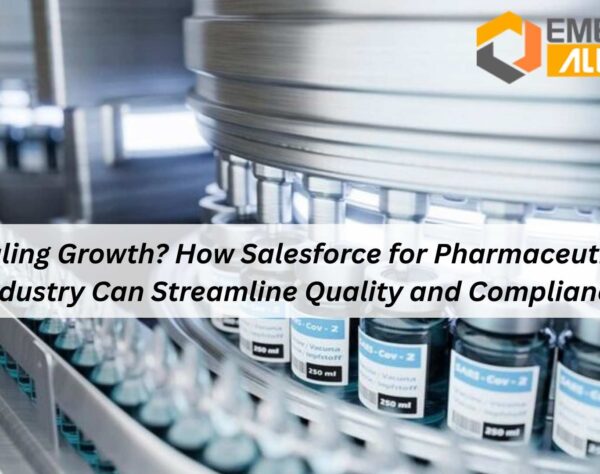
Salesforce for Pharmaceutical Industry: A Smart Investment

How Salesforce CRM Transforms Pharmaceutical Industry for Greater Efficiency and Growth
The pharmaceutical industry is one of the most dynamic and highly regulated sectors in the world. With a global market that demands precision, efficiency, and compliance, pharmaceutical companies face unique challenges when it comes to managing relationships with healthcare providers, tracking sales, ensuring compliance, and responding to customer needs. This is where Salesforce CRM steps in, offering a comprehensive and robust solution to streamline business processes, enhance customer relationships, and drive growth.
Salesforce CRM for Pharmaceutical Industry is designed to meet the complex needs of pharmaceutical companies. By leveraging Salesforce CRM software, organizations can effectively manage their sales pipeline, improve marketing strategies, ensure compliance, and enhance customer satisfaction.
In this blog, we will explore the benefits, features, and reasons why investing in Salesforce CRM is a smart move for businesses in the pharmaceutical industry.
Understanding Salesforce CRM for Pharmaceutical Industry
Salesforce CRM is a cloud-based platform that helps businesses manage their relationships with customers, streamline their sales processes, and enhance operational efficiency. In the pharmaceutical industry, where customer relationships, compliance, and sales are highly regulated and complex, Salesforce CRM provides a solution to handle these challenges effectively.
By integrating customer data from various touchpoints, Salesforce CRM software enables pharmaceutical companies to build a centralized database that offers real-time insights into customer interactions, sales activities, and market trends. This data-driven approach empowers pharmaceutical companies to make informed decisions and improve their strategies.
Key Benefits of Salesforce CRM for Pharmaceutical Industry
1. Improved Customer Relationship Management
One of the primary Salesforce CRM benefits for the pharmaceutical industry is its ability to enhance customer relationships. Whether it’s healthcare providers, patients, or distributors, Salesforce helps companies personalize interactions, track engagement, and improve communication. With a 360-degree view of the customer, sales and marketing teams can tailor their approaches to meet the unique needs of each stakeholder, resulting in stronger, long-term relationships.
2. Streamlined Sales Processes
Managing a complex sales pipeline in the pharmaceutical industry can be daunting. Salesforce CRM software simplifies this by automating tasks, providing real-time updates, and centralizing data. Sales teams can track leads, opportunities, and account progress with ease. Additionally, Salesforce helps in identifying the most promising leads, improving conversion rates, and shortening the sales cycle. With better visibility into the sales pipeline, companies can make smarter decisions about resource allocation.
3. Compliance and Regulatory Management
The pharmaceutical industry is heavily regulated, with strict guidelines governing everything from product approvals to marketing practices. Salesforce CRM features include tools for tracking compliance with industry standards and regulations, ensuring that every aspect of the business stays within legal boundaries. By automating reporting and ensuring transparency, Salesforce CRM helps pharmaceutical companies avoid costly compliance violations and maintain a good standing with regulatory bodies.
4. Enhanced Collaboration and Communication
The pharmaceutical industry often involves complex workflows and multiple departments, from research and development (R&D) to marketing and sales. Salesforce CRM helps break down silos between these departments, allowing them to collaborate seamlessly. Whether it’s sharing customer insights, tracking progress on marketing campaigns, or coordinating efforts on a new drug launch, Salesforce ensures that everyone is on the same page, leading to greater efficiency and improved outcomes.
5. Data-Driven Decision Making
With the vast amount of data generated in the pharmaceutical industry, making sense of it all can be overwhelming. Salesforce CRM benefits include powerful analytics and reporting features that transform raw data into actionable insights. With customizable dashboards, pharmaceutical companies can track key performance indicators (KPIs), monitor sales trends, and predict future market shifts. This data-driven approach enables informed decision-making, helping organizations stay ahead of the competition.
6. Improved Marketing Campaigns
Effective marketing is crucial in the pharmaceutical industry, where communication with healthcare providers, patients, and distributors is essential. Salesforce CRM software provides tools to design, track, and optimize marketing campaigns. By using customer segmentation, personalized messaging, and targeted campaigns, pharmaceutical companies can reach the right audience with the right message. Furthermore, Salesforce enables companies to track the performance of their campaigns and adjust strategies in real time.
Key Features of Salesforce CRM for Pharmaceutical Industry
1. Customizable Dashboards and Reports
Salesforce CRM features include customizable dashboards that allow pharmaceutical companies to visualize critical metrics in real-time. Whether it’s sales performance, compliance tracking, or customer engagement, Salesforce offers flexible reporting options that can be tailored to meet the unique needs of the pharmaceutical industry.
2. Mobile Access
Pharmaceutical sales teams are often on the move, meeting with healthcare providers or attending conferences. Salesforce CRM offers mobile capabilities, allowing sales representatives to access critical customer data, update records, and track sales activities from anywhere. This on-the-go access ensures that teams stay productive and informed, no matter where they are.
3. Integration with Third-Party Applications
The pharmaceutical industry uses a variety of third-party tools for inventory management, drug development, and customer engagement. Salesforce CRM software offers seamless integration with other enterprise systems, enabling pharmaceutical companies to create a unified tech ecosystem. This integration reduces manual data entry, minimizes errors, and improves operational efficiency.
4. Automated Workflows
Salesforce CRM automates repetitive tasks and processes, such as data entry, lead nurturing, and reporting. In the pharmaceutical industry, where time is critical, automation helps teams stay focused on high-value activities. With automated workflows, sales and marketing teams can ensure that no task falls through the cracks, resulting in faster response times and better customer service.
5. AI-Powered Insights
Salesforce’s artificial intelligence (AI) capabilities provide predictive analytics and insights that help pharmaceutical companies make smarter decisions. From sales forecasting to customer behavior predictions, AI-powered tools can uncover trends and patterns that might otherwise go unnoticed. These insights allow pharmaceutical companies to adjust their strategies quickly and stay competitive in a fast-changing market.
Why Salesforce CRM is a Smart Investment for Pharmaceutical Companies
The pharmaceutical industry is increasingly embracing digital transformation, and adopting Salesforce CRM is a key part of this shift. With its ability to streamline processes, enhance customer relationships, and improve data-driven decision-making, Salesforce provides a comprehensive solution for the unique challenges faced by pharmaceutical companies.
By investing in Salesforce CRM software, pharmaceutical companies can increase efficiency, reduce costs, and improve compliance, all while positioning themselves for long-term success in a highly competitive market.
FAQs
1. How does Salesforce CRM help improve compliance in the pharmaceutical industry?
Salesforce CRM helps ensure compliance by automating regulatory reporting, tracking product approvals, and providing transparency into marketing practices.
2. What are the key features of Salesforce CRM for pharmaceutical sales teams?
Key features include mobile access, automated workflows, customizable dashboards, and integration with third-party tools.
3. How can Salesforce CRM enhance collaboration in pharmaceutical companies?
Salesforce CRM enables seamless communication between departments, ensuring that sales, marketing, and R&D teams are aligned and working towards common goals.
4. Can Salesforce CRM help with customer segmentation in the pharmaceutical industry?
Yes, Salesforce CRM offers robust segmentation tools to categorize customers based on various criteria, allowing for targeted marketing and personalized communication.
5. How does Salesforce CRM benefit pharmaceutical marketing campaigns?
Salesforce allows for the creation, tracking, and optimization of marketing campaigns, ensuring that pharmaceutical companies reach the right audience with the right message.
6. What makes Salesforce CRM ideal for the pharmaceutical industry?
Its ability to integrate customer data, automate workflows, and provide real-time insights makes Salesforce CRM a valuable tool for pharmaceutical companies.
7. How can Salesforce CRM improve sales forecasting in the pharmaceutical industry?
Salesforce’s AI-powered insights and predictive analytics help sales teams accurately forecast future sales and identify trends in the market.
8. Is Salesforce CRM scalable for growing pharmaceutical companies?
Yes, Salesforce CRM software is highly scalable and can grow with your business, accommodating new departments, processes, and markets.
9. What role does Salesforce CRM play in improving customer relationships in the pharmaceutical industry?
Salesforce CRM provides a 360-degree view of customers, enabling personalized interactions and better communication, which leads to stronger relationships.
10. How does Salesforce CRM help pharmaceutical companies stay competitive?
Salesforce CRM enables data-driven decision-making, streamlines operations, improves marketing efforts, and enhances customer engagement, helping companies stay ahead of competitors.







